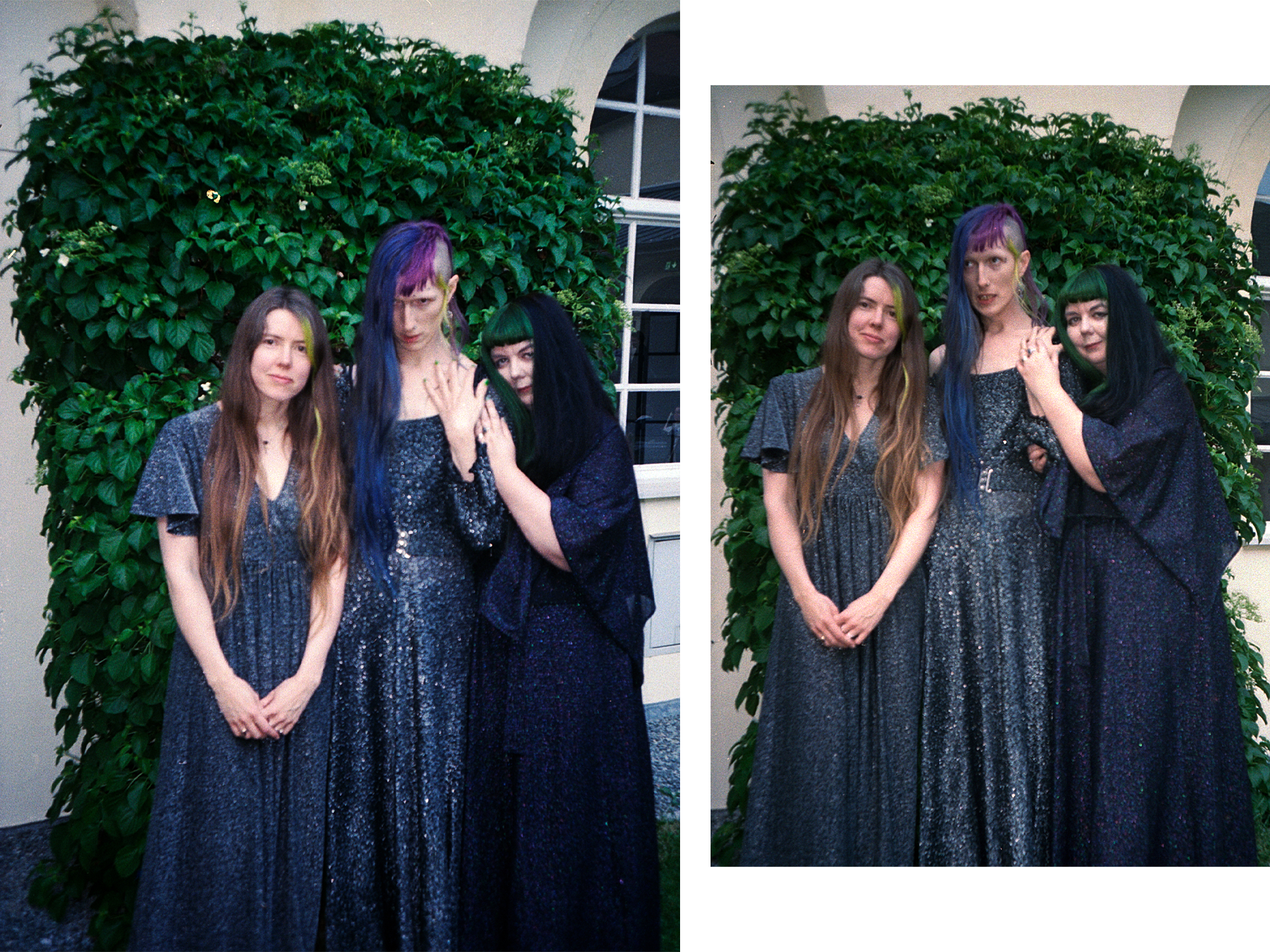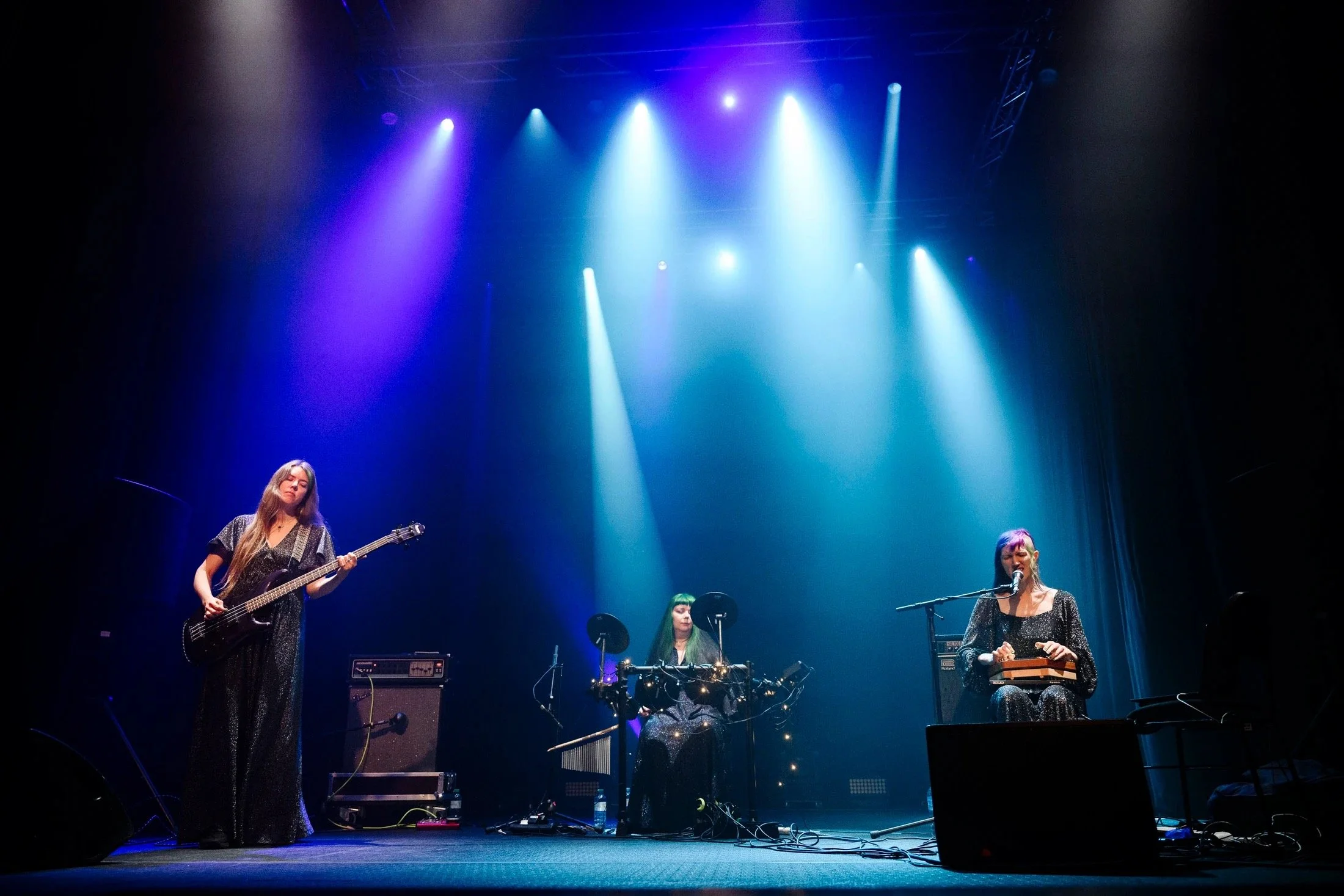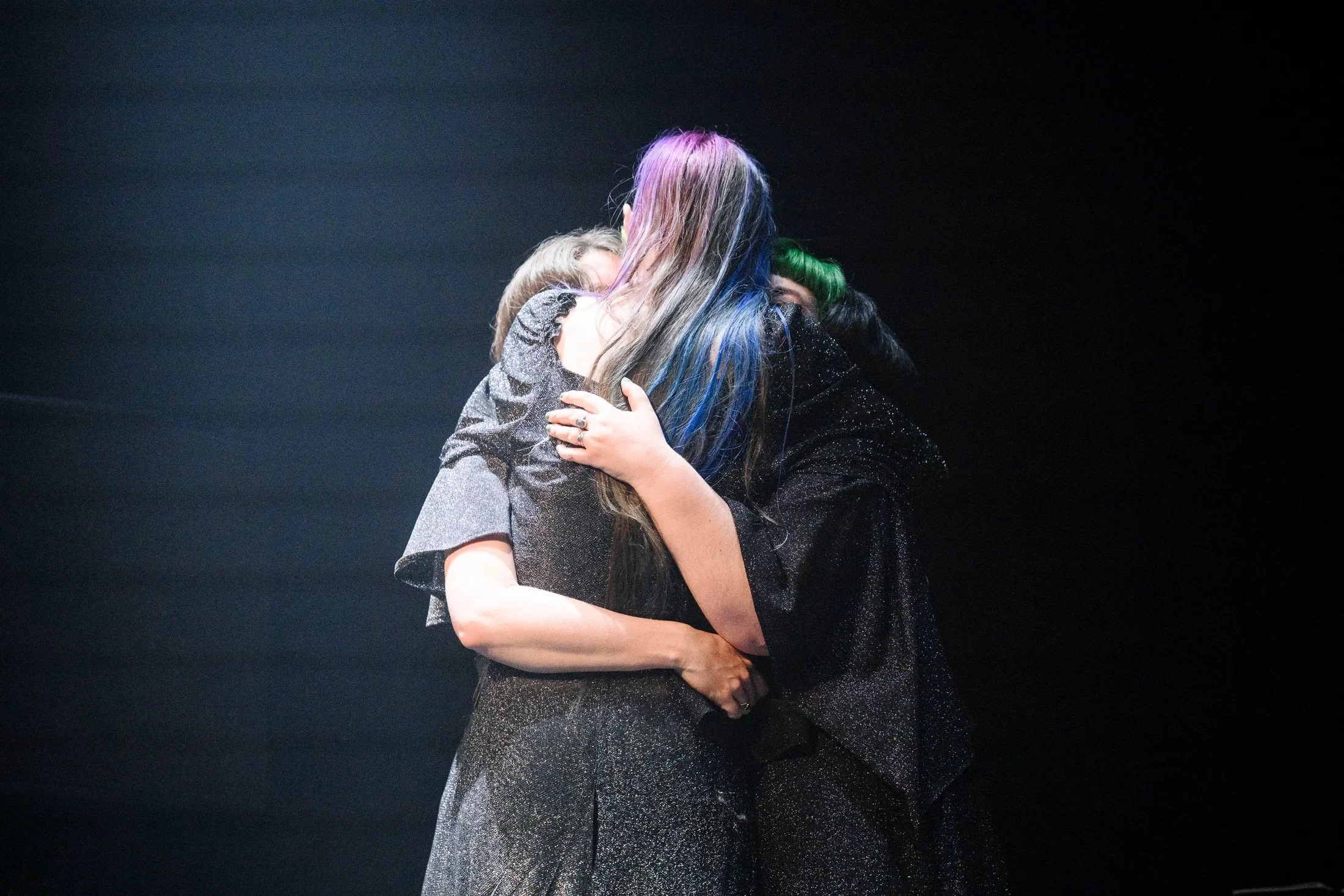“It’s totally a strength to be able to say, Yes, I am sad”
The (outstanding) British-Canadian all-female avant-goth trio Tristwch Y Fenywod on depression, gothic and the therapeutic effect of creating - interviewed at Donaufestival 2025 in Krems.
Tristwch Y Fenywod: Sidni Sarffwraig, Gwretsien Ferch Lisbeth, Leila Lygad (left to right) | © Isabella Andrea Pacher
Tristwch Y Fenywod — Welsh for The Sadness of Women — released their first, self-titled album last year. Formed in Leeds, the trio draws from a wide palette of sonic influences: 80s goth, industrial noise, experimental electronics, and folk instrumentation. But it’s not just the sound that sets them apart — it’s the intention behind it.
When we met at Donaufestival 2025 in Krems, they spoke openly about how their music emerged from a need to process loss, alienation, and the emotional aftershocks of recent years. What began as a personal outlet became a shared practice — one rooted in friendship, radical honesty, and a commitment to making space for vulnerability in both art and life.
In this conversation with Bohema, Tristwch Y Fenywod reflect on their creative beginnings, the cultural weight of sadness, and why embracing emotion — especially within a femme identity — can be cathartic to both artists and audience.
Bohema/Anton Schroeder: Your music is quite obviously influenced by 80s Goth and No Wave music. Is this something you grew up with? How did you find your way to this kind of music?
Gwretsien Ferch Lisbeth (singer/zither/double harp): I’m totally self-taught. My parents aren't musicians, but they really liked music a lot. There was a lot of music playing in the house. So when I first got the sense that I wanted to maybe have a go at playing an instrument or playing in a band, they were encouraging. But I never really had lessons or anything like that — just purely out of enthusiasm, I suppose.
Leila Lygad (electronic drums): I’ve just always been interested in heavy music. I got introduced to 80s goth probably in my early teens through older friends and just really connected to it. I was really drawn to the emotion in the music — how music could be fucking sad too. That was such a valuable thing.
So much music in the mainstream media… I was just too fucking depressed to listen to it. With goth, finally I arrived at something I could listen to and empathize with, and have this sense of identity with. I had quite a troubled home life, so I spent a lot of time, especially in summer, living with friends — on sofas and things. They introduced me to stuff like Alien Sex Fiend, and The Cure. Listening to that I thought: this is a mindset that I can really connect to.
Sidni Sarffwraig (bass): You guys are from the right part of the world, since a lot of goth is from England and northern England.
“I was very depressed and alienated, and it just felt like this dark music was a lifeline.”
G: Especially Leeds — it’s the home of goth, it’s Ground Zero. My parents were also into heavy music and fantasy and science fiction. By the time I was starting secondary school, I was already very familiar with heavy metal and all this kind of stuff, so it was like a really logical progression — you would find stuff that was darker and more mysterious and more crazy, and would allow you to find that hidden part of yourself, that kind of almost taboo side of society. It was very easy to identify with these things. And I think I had a very similar sense of connecting to it as Layla. I was also very depressed and alienated, and it just felt like this dark music was a lifeline. A reason to keep living in some way. These bands were communicating things that just made intuitive sense. Mainstream music was completely alienating. I remember hearing things like black metal and the Cocteau Twins and Dead Can Dance, also The Cure and Throbbing Gristle — they were talking about things that were not abstract. They were immediate things that we had experienced. Like a direct path to our own sense of where we are.
S: I’m from Western Canada. So there's not a lot of goth history there. But I was really interested in experimental music, and some of my favorite early experimental music is This Heat and early Cabaret Voltaire. So I got really into industrial music.
And then when I started hanging out with these two, seven years ago, I learned a lot about goth just from spending more time in North England and Wales — thinking about the landscape and listening to the music that was made there. And I just got it a lot better after spending time in the place.
B: You just described Leeds as “Ground Zero of goth.” Is it still like that today? In Austria or Germany, there is a sense of crisis in youth culture and subcultures…
S: Well, these two just started a goth night that is really amazing — it’s called Nox...
G: Keeping it real…
S: …so they're actively working to make sure that there's a present goth space in Leeds. A lot of different people who don't know each other are starting to come to the nights, and I think that's a really interesting sign. It's a scary time politically. So it makes sense for goth to be a music people are connecting to.
B: You talked about depression as a reason why you got into goth. Is that also a reason why you then started to make music?
L: It’s like a survival mechanism, you know? Before I made music, I just fucking self-harmed and had very self-destructive behaviors. And it was only when I discovered I could actually process emotion, trauma and grief through music that I stopped self-destructing.
That was the point where I was like: oh, there is a way to think about these things and turn them into something that feels good — that feels worthwhile.
S: And so many people have done it and created these amazing albums for us to listen to. We read about their lives and we're like: “Wow, they went through really hard stuff and made this incredible record.” So we know that it helps other people too — to process their emotions through art.
Tristwch Y Fenywod performing at Donaufestival 2025, Krems | © David Visnjic / donaufestival
B: Your band name translates to “Sadness of Women.” Is that also connected to what you just described?
All: Oh, yeah. Yeah, yeah.
G: This is definitely reflective of our lived experiences. The name was actually a nickname that Sidni used to call me, but then we all felt that it was a very fitting reflection of the things we would be communicating — the experiences we were sharing as friends.
“You know, we’re constantly numbed. We’re constantly told not to feel things.”
L: When we started the band we were all experiencing significant personal loss… Everyone was — it was after the pandemic, everybody was going through heavy shit. It felt like a universal shared experience of femininity. Vulnerability is seen as a weakness but it’s totally a strength to be able to say, “Yes, I am sad,” or “I am fucking depressed.” We are trying to transmute that into something that is good for us and hopefully for other people. We hope it’s a catharsis we can share. I love it when people come to us after shows and they’re like, “I needed that,” or “I needed to let something out,” or say they cried to a song. To feel something. You know, we’re constantly numbed. We’re constantly told not to feel things. Don’t cry in public. Don’t express yourself. Don’t shout too much.
G: …Don’t be in your body. Just this way that you’re encouraged to have this masculine mastery over your body and of nature — which is ultimately a very destructive approach and behavior. I think it alienates you from your own self and from the world that you live in.
I really feel that sadness is a psychedelic experience. Allowing yourself to actually process grief and depression can be a visionary thing — it allows you to gain a deeper sense of not only where you are at that moment, but also potential futures. Fantastical things can come about in that chemical, physical process of your body working its way through these dark things. I think it's just a necessary step to actually exist in this world of turmoil. Being ignorant of it… that only makes you more lost in a way.
At least we know what's going on, even if it’s very difficult. I think that’s immensely grounding and it opens up so many doors creatively — which cycles back to what you were asking about in the beginning: the genesis of feeling like musical expression is a way to deal with dark emotions. I feel like there’s an inextricable link between the two. I have always felt like I am the most creative when I'm feeling sadness. You have to go through this kind of pain at the beginning. But then there's this revelation that comes out of it — and, you know, it kind of goes beyond what can be easily explained. I think we all intuitively feel that it's very important to allow oneself to go through it.
S: I think people can access it in their own way. You don't always have to be sad to be creative. But if you're in a situation that sucks and you’re not feeling very empowered, one thing that you can do is make stuff. It’s a way to have some sort of active empowerment in a difficult situation.
B: I think it’s also quite an interesting name in the way that sadness is stereotypically attached to women — more than men. But then again, that stereotypical feminine sadness is more of a quiet weeping. Your music sounds quite different...
S: Yes. These sounds of sadness can also be the most powerful and scary sounds. A scream of anguish is a pretty intense thing. It’s possible to have both sides in expressing that emotion. That it’s a vulnerable thing, but then also having it be very powerful and intense. It may be very scary for some people. As Leila and Gwretsien said, the project is really about telling people that vulnerability in your femininity is okay. And it's also actually a powerful thing. In a world that's so patriarchal and so homophobic, transphobic, etc., trying to just own the emotions that we’re always put down for having — and be proud of them and use them in creativity — is telling other people that they can do that too.
It doesn't always have to be so heavy. It can also just be about living with sadness that happens all the time, and figuring out how to navigate that without being totally dragged under by it.
“With love — not in a nihilistic way.”
G: Yeah. And just to dismantle this idea that allowing oneself to feel sadness is about being this weak, frail thing. That’s just another one of these sexist Enlightenment sort of ideas — that being in your body and feeling emotions is somehow lesser… This idea of femininity being the opposite of rationality or control. We're trying to really smash that apart in a way. With love — not in a nihilistic way.
S: The world would be a different place if people knew how to deal with their emotions. It’s pretty evident that politics is just people who got bullied at school and didn’t go to fucking therapy. For real.
© David Visnjic / donaufestival




